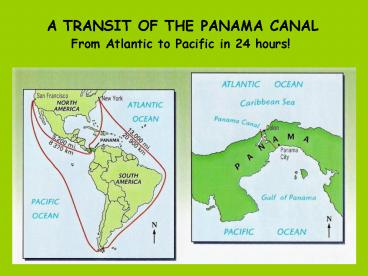A TRANSIT OF THE PANAMA CANAL - PowerPoint PPT Presentation
1 / 27
Title:
A TRANSIT OF THE PANAMA CANAL
Description:
Approaching the Gatun Locks & leaving the Caribbean Sea! ... The most ever paid was $208,653.16, by the cruise ship Norwegian Star in 2001. ... – PowerPoint PPT presentation
Number of Views:1222
Avg rating:3.0/5.0
Title: A TRANSIT OF THE PANAMA CANAL
1
A TRANSIT OF THE PANAMA CANAL From Atlantic
to Pacific in 24 hours!
2
The Panama Canal Historical Facts
- Construction of a sea level canal was started by
France in 1881. A canal with a system of locks
was finished by the United States in 1914. - Construction costs reached approximately 375
million US dollars. - Over 50,000 workers were employed to build the
Panama Canal and over 5,600 of them died during
its construction.
3
The Isthmus of Panama and the amazing canal that
connects two of the worlds great oceans!
4
(No Transcript)
5
(No Transcript)
6
The Panama Canal . . . by the numbers?
- A ship traveling from New York to San Francisco
would save 7,872 miles by transiting the canal
instead of passing around Cape Horn. - The canal is 50 miles or 80 kilometers long.
- The locks raise ships 85 feet above sea level so
they can enter Gatun Lake. - Each time a ship passes through the canal, about
52 million gallons of water must flow into the
locks from Gatun Lake and out to sea. - The average time for a vessel to transit canal
waters is approximately 24 hours.
7
Approaching the Gatun Locks leaving the
Caribbean Sea!
8
Inside Gatun Lock 1 Gates starting to close!
9
Lock 1 Gates closed and water starting to rise!
10
Add 26 million gallons of water from Gatun Lake
and the ship is elevated almost 30 feet!
11
Moving from lock 1 into lock 2
12
Lock 2 Going up !
13
A Towing Locomotive
Moving to Lock 3
14
Gate closing in lock 3 Ready for our final 30
feet!
15
Geoman going up-the proof is in the picture!
16
Entering Gatun Lake Two hours after we entered
Lock 1 26 Meters or 85 feet above sea level!
17
Two-way traffic on Gatun Lake A Panamax cargo ship
18
Entering the Culebra Cut - Almost half way to the
Pacific!
19
The canals narrowest point About to pass under
the Pan-American Highway!
20
The first step back down to the Pacific via
the Pedro Miguel Lock to Miraflores Lake!
21
Exiting the Perdo Miguel Lock into Miraflores Lake
22
Approaching the Miraflores Locks Almost home!
23
Miraflores Lock 2 Our final decent!
24
The PC More Historical Facts
- More than 850,000 vessels have transited the
canal since 1914. - The United States controlled the Canal Zone until
December 31, 1999 when it was returned to the
country of Panama. - Over 9,000 people are needed to operate the canal
today.
25
The Panama Canal by the numbers continues!
- Each lock is 110 feet wide and 1,000 feet long.
- The largest ships that can navigate the Panama
Canal are known as Panamax vessels. They can be
965 feet long, 106 feet wide, and have a draft or
depth of 39.5 feet. - The average cost for a ship to use the canal is
47,000. The most ever paid was 208,653.16, by
the cruise ship Norwegian Star in 2001. The
lowest toll ever charged was 36 cents. It was
paid by Richard Halliburton for swimming the
canal in 1928. - An average of 12,500 ships transit the canal
each year. - The top five countries that utilize the canal
are the United States, Japan, Canada, China, and
Chile.
26
- GEOMANS PANAMA CANAL GEO-QUESTIONS!
- What is an Isthmus? Why would the Isthmus of
Panama be considered an important or even
strategic place? - 2. Ships passing through the canal move in which
two general directions? - 3. What was the major cause of death for the 10
of the canal work force that died during its
construction? - 4. How did the canal engineers use their
knowledge of geography and basic science to
overcome the challenges of building the canal? - 5. How much room is there to spare when a
Panamax ship is enclosed in one of the canal
locks? - 6. Is the Panama Canal still a valuable asset to
world trade and transportation even 90 years
after its completion? Explain your answer.
27
Panama Canal Resources
- National Geographic Video
- Panama Canal The Brave Who Built The Impossible
(51 minutes). - Website The Panama Canal Authority
- www.pancanal.com/eng
- Historical Pictures, Live Lock Cams, and much
more.































